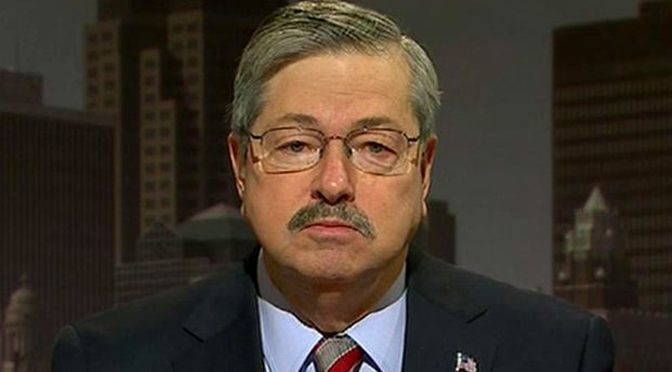On Wednesday, Jason Miller, a spokesman for President-elect Donald Trump, confirmed that Iowa Governor Terry Branstad has accepted Trump’s offer to serve as ambassador to China under the new administration, according to The Des Moines Register.
Branstad, who in addition to serving as Iowa’s governor since 2011, also held that office from 1983 to 1999, is an excellent fit for the job, says Miller:
Gov. Branstad, obviously as Iowa’s long-serving governor, is someone who has considerable public-policy experience, but also someone who has a lot of experience and [a] great grasp of trade issues, agriculture issues, has a tremendous understanding of China and Chinese people… It’s very clear that Gov. Branstad is someone who will represent our country well on the world stage.
Branstad has experience working with Chinese President Xi Jinping, and has reportedly developed a friendship with him. The Des Moines Register reports that Branstad first met Xi in 1985, when Branstad was serving his first term as governor. Xi was a Communist Party official, visiting Iowa to learn about agricultural techniques. In 2011, Branstad again met with Xi, this time in China, and invited him to visit Iowa again – an offer Xi accepted.
Tim Albrecht, a former aide to the governor, says that Branstad’s visits to China and history of working with Xi means that the people of China know Branstad, and like him. “There’s not just a respect there,” explained Albrecht, “there’s a kinship that’s hard to describe.”
The appointment of Branstad as ambassador to China is important to pro-lifers for several reasons. First, Branstad is a proud pro-lifer with a solid record of advancing the value of human life (although some pro-lifers would contend that Branstad should have been stronger and more determined in pursuing the defunding of Planned Parenthood in Iowa).
Second, China is among the world’s worst offenders when it comes to forced abortions. For years, the Communist state’s notorious One-Child Policy resulted in countless forced abortions. Despite recently replacing the policy with a Two-Child Policy, women and families are still being pressured into abortions.
Finally, Branstad’s positive relationships with Chinese leaders and history of working together could increase his influence. As US ambassador to China, Branstad will, of course, have no authority to alter Chinese law or policy regarding abortions. However, Branstad should be able to build on current relationships and perhaps improve US relations with China, while continuing to promote the value of human life.







